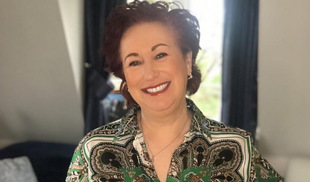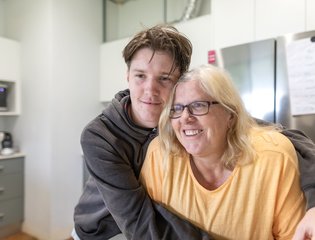Alison: I can see progress made over the last 10 years

Alison was diagnosed with stage 4 ovarian cancer 10 years ago, in 2014.
Alison’s journey is a powerful reminder of why awareness, early diagnosis, and access to genetic testing are vital. Through her experiences over the last 10 years, Alison sheds light on the challenges faced by ovarian cancer patients, the advancements in treatment, and the importance of understanding hereditary cancer genes.
Here is Alison’s story, in her own words:
This July marked my 10 years cancerversary.
I look back over these hard 10 years I can see how treatment has advanced and some progress has been made when it comes to ovarian cancer together with BRCA knowledge and testing.
Unfortunately, ovarian cancer is still being missed by doctors with ladies like myself still being told they have IBS or diverticulitis even 10 years later. They continue to be diagnosed at a later stage. Early diagnosis is vital.
From symptoms to diagnosis
For eight months I had been having what I know now are classic ovarian cancer symptoms.
I had a very delicate stomach and a sharp pain in my lower left pelvis area. I then developed a very painful frozen shoulder and my fingers started to curl. I was under three different specialist and had been told after a colonoscopy eight months previous that I had diverticulitis. No simple CA125 blood test was done or family history asked about, and I was told to come back in five years!
One morning I woke up with two thick veins protruding down each breast – I did use Dr Google and learnt it was called Mondors disease, and was then told I had a rare breast cancer.
It was during this breast cancer surgery for that it was discovered that too many lymph nodes were affected. After two long weeks in hospital and many tests and scans - I was told the devastating news that I also had inoperable stage 4 ovarian cancer and within two days of leaving hospital I started harsh chemotherapy. My CA125 was over 3000- the normal level is below 35.
BRCA was mentioned for the very first time and explained to me in great detail what it meant, how it was inherited and therefore it could affect my family especially my daughter.
My bloods were sent to the United States for BRCA testing and it took approximately one month to get the result - now it can be done through a simple spit test.
Jewish heritage and BRCA gene fault risk
It felt obvious to me that it was going to come back positive especially because I was also Jewish. I learnt that 1 in 40 Jewish people are carrying are BRCA mutation.
I knew a little about BRCA because of Angelina Jolie - but I also knew she had inherited it from her mother and had no idea that a father could pass both breast and ovarian cancer risk to their daughter.
It turned out that I was carrying the classic Jewish founder BRCA1 mutation 185delAG and that it had been passed down through my healthy 89 year old father who we tested quickly due to his age! His sister had died of breast cancer at 52 and his mother also had cancer.
It was important to me to know where this fault came from so I could inform any family members of this flaw in our family and giving them the choice of preventative surgery that I was denied.
I was absolutely totally heartbroken to find out that I had unknowingly passed on the risk onto my beautiful 23 year old daughter Gaby. At the time I was told I wouldn’t be here to support her through her preventative surgery - but I have been here for four!

Alison and her daughter, Gaby
10 years of treatment progress
Ten years ago PARP inhibitors were just being talked about and being trialled and especially being geared for BRCA carriers with ovarian cancer.
I remember the words of my wonderful oncologist telling me that he was going to keep me on Avastin in the hope that it would keep me going so that I could get access to a PARP Inhibitor and that’s exactly what happened.
Avastin - a targeted therapy - has now been proven that it really does help to stop ovarian cancer recurrences and is used regularly as part of standard treatment.
I remember doing my very first ever television interview nine years ago for Ovarian Cancer Action about Avastin because at the time the cancer drug fund felt it was too expensive to fund and only worked for small percentage of people- But it was working for me.
I was kept on Avastin for a tough three years and yes it does have side effects. When it was affecting my kidneys too much it was stopped and I very quickly relapsed.
But now we made a decision that I was able to have surgery. PARP Inhibitors had also now been approved to use after third line treatment.
I had a radical hysterectomy but ended up in ICU with sepsis and C-Diff and spent over a month in hospital. My only aim was to get onto a PARP Inhibitor and I reluctantly agreed to go back onto chemo - but “only!” on carboplatin as that was what I need to have to gain access to a PARP inhibitor.
The surgery biopsy proved that the breast cancer was actually secondary having spread up from the ovary. Which is very rare and the reason that the breast cancer marker was normal.
PARP inhibitors have since been approved for use after first line treatment and I am proud that I helped with its approval being a patient advocate for Olaparib at NICE.
I have never been able to stop treatment and have been taking Olaparib for over 6 years now which keeps me relatively stable but sometimes I find the side effects too much so I give myself “olaparib breaks” and it helps to reset my body and my oncologist is happy for me to do this rather than stop it completely.
Putting the focus on ovarian cancer
Over the last ten years, I have noticed that both ovarian cancer and BRCA are being spoken about more. Ovarian cancer is at the moment a huge topic with a character from Coronation Street being diagnosed with a very rare type of the disease and Ovarian Cancer Action has been helping the team portray this correctly.
I have recently been a Patient and Public Voice Expert in the NHS England Jewish BRCA Testing Programme which was launched in January. Amazingly over 22,000 people have applied for testing. It is a free spit test which is sent to your house and very easy to do.
It’s been an amazing success and hopefully this will allow this free testing to be available for the whole of the UK in the future.
There are many tough choices to be made as a BRCA carrier. My beautiful daughter Gaby had a preventative double mastectomy at the tender age of 26. I am incredibly proud of her strength and determination to do this.
She now and other carriers like her have so many important decisions to make around starting a family and reducing her ovarian cancer risk. She is currently on the PROTECTOR trial which is for BRCA carriers from 30 years old and older and is looking at removing the fallopian tubes initially to reduce ovarian cancer risk, then waiting until closer to natural menopause to remove the ovaries.
There is no right answer and everyone has to make their own decisions and judgement depending on their situation, but I do worry about who is looking after BRCA carriers on their journey.
Alison’s advocacy has played a crucial role in raising awareness and advancing treatment for BRCA carriers. She continues to inspire others to take control of their health and explore options such as genetic testing and preventative care.
Learn more about BRCA and hereditary cancer
Alison’s story highlights the power of genetic testing and early intervention. If you have a family history of ovarian or breast cancer, understanding hereditary cancer genes like BRCA could save lives.
Visit our hereditary cancer risk hub to learn more about BRCA testing, preventative surgery, and how you can take action for yourself and your loved ones.
Together, we can work towards earlier diagnoses, better treatments, and fewer lives lost to ovarian cancer.


